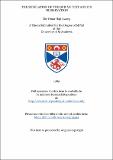The revelation of the Qur'ān text and its preservation
Abstract
This study deals with the revelation of the Qur'ān text and its preservation during the lifetime of the Prophet and its compilation in the reign of Abū Bakr and further, the second compilation by ʿUthmān which was considered as the complete and authentic text of the Qur'ān. The study consists of five chapters. In chapter one we try to demonstrate the need of people to be together in a good society which preserve the law and order. In order to keep people in law and order, the Qur'ān gives its unique suggestion and solution that people must be mu'addab (well- behaved). In this connection certain principles of law are introduced. Chapter two examines the nature of seven aḥruf in which the Qur'ān was revealed and we come to a conclusion that seven aḥruf is no more than variant readings of the Qur'an in a loose sense. Chapter three deals with the problem of preservation of the Qur'an in pre-Uthmānic time as well as its compilation. The compilation were based on the memory of the companions as well as from the written muṣhaf of individuals. In chapter four we discuss the theory of naskh of the Qur'an. The difficulty to determine abrogated verses has produced a lot of alleged abrogated verses which seem to be different from one scholar to another. As a matter of fact, naskh is very important because the contradictory verses would spoil the completeness and trustworthiness of the Qur'ān and naskh is the only way to solve the problem. In the last chapter, we discuss how the Qur'an was transmitted generation by generation and the idea of teaching methods which lie in it. Though it was revealed hundreds of years ago its teachings are still dominant and the methods of educating people suggested by it are still applicable.
Collections
Items in the St Andrews Research Repository are protected by copyright, with all rights reserved, unless otherwise indicated.

